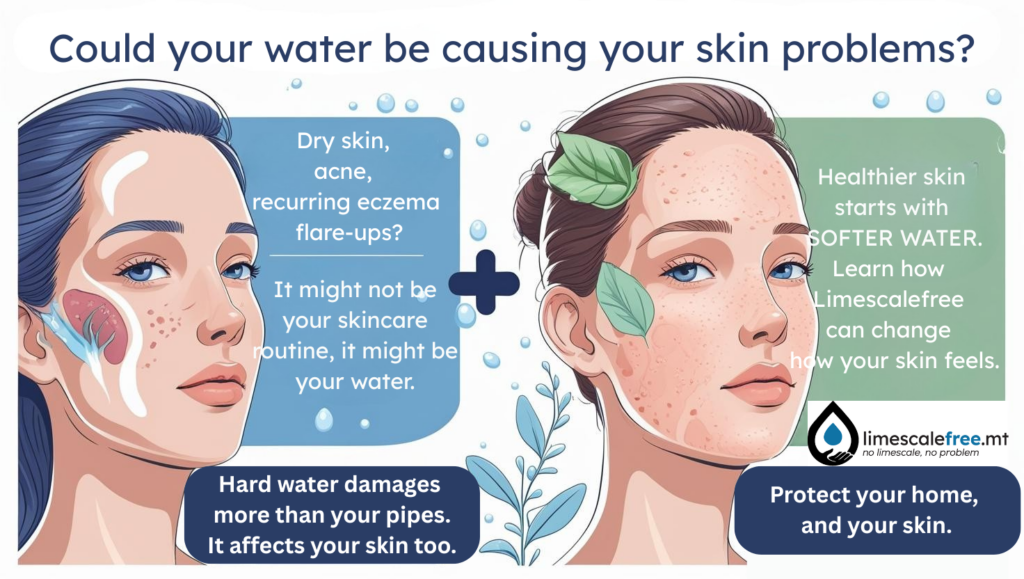Hard water and skin problems

Essential Facts: Can Hard Water Worsen Eczema and Skin Irritation? Here’s What Science Says
Published on June 1, 2025
Many people in Malta suffer from recurring skin problems like dry patches, acne, or eczema — and the cause might be hiding in your tap water.
Dry, itchy skin that never quite seems to heal? You’re not alone — and your water might be to blame.
Scientific research increasingly supports a connection between hard water and skin conditions, especially eczema. In this post, we break down what the science says — and what it means for you if you live in a hard water area like Malta.
🔬 The Science: How Hard Water Affects Your Skin
Multiple studies suggest a strong link between hard water and skin problems. A 2021 study by the National Eczema Association found that hard water may increase the risk of eczema in infants.
Hard water contains high levels of calcium and magnesium ions. These minerals can impact skin health in several ways — from weakening your skin’s protective barrier to triggering dryness and irritation.
1. Disrupts the Skin Barrier
Hard water raises the pH level of your skin, which weakens its natural acidic shield. This leaves the skin more vulnerable to irritants, allergens, and environmental damage.
2. Soap Scum Buildup
Minerals in hard water bind with soap to form insoluble residue. These compounds can stick to your skin, clog pores, and cause further irritation.
“Residual soap left on the skin due to hard water can aggravate conditions like acne or eczema.” – HealthCentral
3. Increases Risk of Eczema
Children growing up in hard water regions are statistically more likely to develop atopic eczema, especially if they have a genetic predisposition (such as filaggrin gene mutations).
“A clear link exists between hard water exposure and increased eczema incidence.” – King’s College London
💧 Do Water Softeners Help?
Products like Limescalefree aim to reduce the impact of hard water on the home and body. Here’s what current research suggests:
Prevention: Some studies indicate that water conditioners may reduce eczema risk in infants.
Treatment: There’s no strong evidence that water softeners cure eczema, but they may help reduce flare-ups and skin irritation by minimizing exposure to mineral residues.
✅ What This Means for Limescalefree Users
The core of Limescalefree’s message — that “hard water can contribute to skin issues” — is backed by science.
That said, it’s essential to position the product as a preventative lifestyle improvement, not a medical treatment. Just like using gentle skincare products, reducing hard water exposure is one piece of a larger skin health strategy.
ℹ️ Skin Care Tips for Hard Water Areas
Test your tap water: Use DIY test kits to measure hardness levels at home.
Use gentle products: Choose unscented, low-pH cleansers and avoid harsh soaps.
Hydrate immediately: Apply moisturizer right after bathing to lock in moisture.
Seek medical advice: If symptoms persist, consult a dermatologist.
🧼 Final Thoughts
Hard water may seem harmless, but its long-term effects on the skin are well documented — especially for people with sensitive or eczema-prone skin.
If you’re looking for a simple, chemical-free way to reduce hard water’s impact, a system like Limescalefree can help protect your skin, your pipes — and your peace of mind.